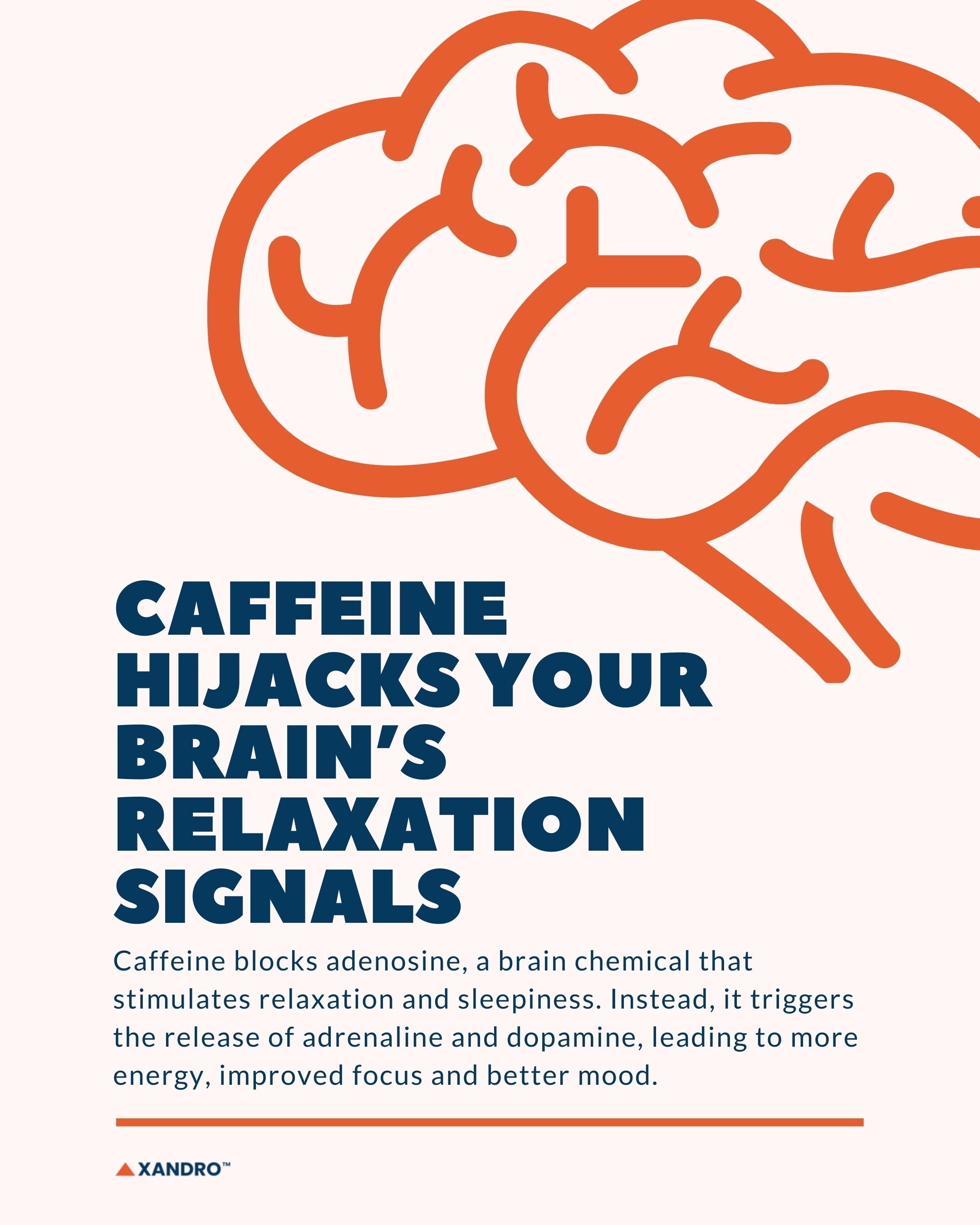Caffeine Side Effects: Signs, Risks & How Much Is Too Much
6th May 2025
The Hidden Side Effects of Caffeine: What You Need to Know
Caffeine is the world’s most widely consumed psychoactive substance. Whether it’s your morning coffee, an afternoon energy drink, or even that piece of dark chocolate, caffeine is a daily habit for millions. But while it can boost alertness and energy, too much caffeine can lead to unpleasant — and sometimes dangerous — side effects.
So, what are the major side effects of caffeine? How do you know if you’ve had too much caffeine? And how much caffeine is too much? Let’s break it all down.
What Is Caffeine?
Caffeine is a natural stimulant. It’s found in foods like coffee beans, tea leaves, cacao pods and kola nuts. It’s also synthetically added to sodas, energy drinks, medications and even some snacks.
Once consumed, caffeine quickly enters your bloodstream, peaking within an hour. Its effects can last 4–6 hours, keeping you alert but sometimes causing unwanted side effects.
How Does Caffeine Work?
Caffeine blocks adenosine, a brain chemical that stimulates relaxation and sleepiness. Instead, it triggers the release of adrenaline and dopamine, leading to:
- Increased energy
- Improved focus
- Better mood
When overconsumed, though, caffeine can push your body into overdrive, leading to negative effects.
Now that you know what caffeine does to your body, what are the negative side effects of caffeine?

What Are the Major Side Effects of Caffeine?
Moderate caffeine intake (up to 400mg/day) is generally safe for most adults, however, side effects of too much caffeine include:
1. Nervousness & Anxiety
Caffeine stimulates your nervous system, which can lead to:
- Restlessness
- Jitters
- Panic attacks (in sensitive individuals)
2. Sleep Disruptions
Caffeine’s half-life is 4–6 hours, meaning it lingers in your system long after consumption, although, for some people, this can last for up to 12 hours. Drinking coffee late in the day can lead to:
- Insomnia
- Fragmented sleep
- Reduced deep sleep
3. Digestive Issues
As for coffee side effects on stomach, caffeine increases stomach acid, which can cause:
- Heartburn
- Acid reflux
- Stomach pain
Further Reading: Caffeine and Natural Fat Burners for Weight Loss
4. Increased Heart Rate & Blood Pressure
High doses can lead to:
- Rapid heartbeat
- Palpitations
- Short-term blood pressure spikes
5. Dehydration & Frequent Urination
Caffeine is a diuretic, meaning it makes you urinate more, potentially leading to dehydration.
6. Dependency & Withdrawal
People who regularly drink caffeine can develop a tolerance, meaning they need more to feel the same effects. This means that quitting suddenly can cause caffeine withdrawal symptoms. Some common side effects of caffeine withdrawal include:
- Headaches
- Fatigue
- Irritability
- Brain fog
Further Reading: Supplements to Boost Focus and Concentration

What Are the Signs of Too Much Caffeine?
If you experience any of these, you may be overdoing it:
- Jitters or shaking hands
- Racing heart
- Anxiety or nervousness
- Trouble sleeping
- Upset stomach or heartburn
- Headaches (from withdrawal or overdose)
Severe cases can lead to caffeine toxicity, with symptoms like:
- Confusion
- Vomiting
- Irregular heartbeat
- Seizures (rare but possible with extreme doses)
How Long Do Caffeine Side Effects Last?
- Immediate effects (jitters, energy boost) peak at 30–60 mins and fade in 4–6 hours.
- Withdrawal symptoms (if you quit) start 12–24 hours after your last dose and can last 2–9 days.
Caffeine Withdrawal Timeline
What are the common side effects of caffeine withdrawal?
|
Time After Last Dose |
Symptoms |
|
12–24 hours |
Fatigue, irritability |
|
24–48 hours |
Headaches (often severe), brain fog |
|
2–7 days |
Mood swings, trouble concentrating |
|
Up to 9 days (heavy users) |
Lingering fatigue |
How Much Caffeine Is Dangerous?
- Up to 400mg/day is considered safe for most adults (~4 cups of coffee).
- Over 600mg/day increases the risk of side effects.
- 10,000mg (10 grams) or more can be fatal, though this is extremely rare and usually from powdered caffeine supplements
Further Reading: All About Nootropics and Boosting Your Cognitive Health
Long-Term Side Effects of Caffeine
While drinking caffeine moderately is generally safe, constant overdrinking can lead to:
- Adrenal Fatigue & Burnout: Caffeine forces your adrenal glands to pump out cortisol (the stress hormone). Over time, this can lead to fatigue, irritability and even hormone imbalances.
- Increased Anxiety & Depression: Caffeine boosts dopamine short-term, but crashing afterward can worsen mood swings. High intake is linked to higher anxiety levels and even panic attacks in sensitive people.
- Bone Loss (Osteoporosis Risk): Caffeine reduces calcium absorption, which may weaken bones over time. Postmenopausal women are especially at risk.
- Heart Problems: While moderate coffee drinkers may have lower heart disease risk, excessive caffeine can raise blood pressure, trigger irregular heartbeats (arrhythmias) and increase heart attack risk in those with existing conditions.
- Gut Health Damage: Caffeine increases stomach acid, which can worsen acid reflux (GERD), ulcers and irritable bowel syndrome (IBS).
- Dependency & Tolerance: Your brain adapts to caffeine, meaning you need more to feel the same boost. This can lead to a vicious cycle of higher intake → worse crashes → more dependency.
For long-term results, you can also take Pure NMN to improve your energy levels, metabolism and anti-ageing targets.
Caffeine Content in Common Drinks
|
Drink |
Caffeine (mg) |
|
Brewed Coffee (235ml/8oz) |
95–200 |
|
Espresso (30ml/1oz) |
63 |
|
Black Tea (235ml/8oz) |
14–60 |
|
Energy Drink (235ml/8oz) |
70–100 |
|
Cola (355ml/12oz) |
35–45 |
|
Dark Chocolate (30g/1oz) |
12–25 |
Who Should Avoid or Limit Caffeine?
Some people are more sensitive to caffeine or are at higher risk of side effects:
- Pregnant women should stay under 200mg/day
- People with anxiety disorders
- Those with heart conditions
- Individuals with GERD or ulcers
- People taking certain medications (e.g., stimulants, some antidepressants)
How to Reduce Caffeine Safely
If you’re experiencing negative effects, try cutting back gradually to avoid withdrawal. Going cold turkey can be brutal, though, so instead, try tapering off slowly.
Step 1: Track Your Intake
- Write down every coffee, tea, soda, or energy drink.
- Calculate your total daily caffeine to see where you can cut back.
Step 2: Gradually Reduce
- Replace one cup of coffee with decaf or tea each week.
- Switch to half-caf blends to ease the transition.
Step 3: Hydrate & Support Your Body
- Drink extra water (caffeine is dehydrating).
- Get more sleep (to compensate for lost energy).
- Try natural energy boosters like:
- Morning sunlight
- Light exercise
- Protein-rich snacks
Step 4: Manage Withdrawal Symptoms
- Headaches? Try ibuprofen + hydration.
- Fatigue? Short naps (20 mins) can help.
- Cravings? Herbal teas (peppermint, ginger) mimic the ritual.
End Note
So, is caffeine bad for you?
Caffeine isn’t inherently bad! It can improve focus, mood and even athletic performance, but like any substance, moderation is key.
If caffeine makes you feel anxious, keeps you up at night, or causes stomach issues, it may be time to rethink how much you’re drinking. Listen to your body and adjust accordingly.
Looking for other ways to boost your focus and cognitive health as you get older, instead of just caffeine? LPC Neuro is the most advanced form of omega-3s, bound with LPC, which helps the omega-3s cross over into the brain. This way, you can actually experience the brain benefits of omega-3s, helping boost your cognition, mood and potentially reduce the risk of neurodegenerative disorders like Alzheimer’s disease.
